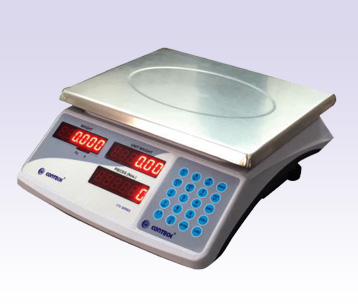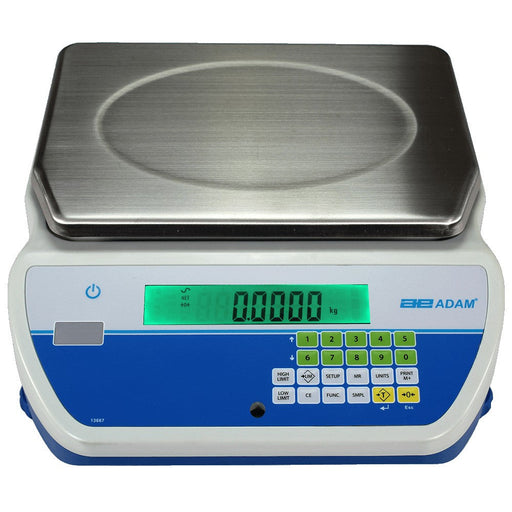Top Industries That Benefit from Using Industrial Scales for Operations
Top Industries That Benefit from Using Industrial Scales for Operations
Blog Article
Just How Industrial Scales Work: A Thorough Overview for New Users
Understanding the mechanics behind industrial ranges is crucial for new individuals who intend to make certain precision in their dimensions. These gadgets count on tons cells and strain gauge modern technology to convert weight into a quantifiable layout, but the nuances of their operation expand beyond simple capability. From the various kinds offered to the essential methods for correct use and upkeep, each aspect plays a significant role in accomplishing trustworthy results. As we discover these elements, one should consider just how these elements interact to enhance performance in varied industrial applications.
Basics of Industrial Scales
Industrial scales are necessary tools used throughout various sectors, consisting of production, logistics, and farming, to ensure precise weight measurements of heavy loads. The essential principle behind industrial scales involves the conversion of weight right into a quantifiable kind that can be displayed electronically or analogically. These ranges employ numerous mechanisms, such as tons cells or mechanical bars, to establish the weight of items positioned upon them.

In addition to their dimension capabilities, industrial scales are developed to endure rough atmospheres, including robust building and construction that resists dust, moisture, and heavy influences. Calibration and upkeep are crucial to guarantee precision, as also minor disparities can result in significant economic ramifications. By comprehending the basics of industrial scales, users can appreciate their importance in numerous commercial applications.
Sorts Of Industrial Scales
Different sorts of industrial ranges cater to the varied needs of various sectors, each designed to manage certain evaluating jobs with precision and integrity. Among one of the most common types are flooring scales, which are optimal for weighing heavy and large items. These ranges generally feature big systems and can suit palletized products, making them essential in storage facilities and delivery centers.
One more type is bench scales, which are usually used for smaller sized things in production and retail settings. They supply exact measurements for items that require accuracy, such as chemicals or parts in production line (Industrial Scales). For mobile procedures, portable ranges supply adaptability and convenience of transport, appropriate for fieldwork or temporary installations
In addition, specialized ranges like checkweighers are made use of in production lines to keep quality control by ensuring that products meet weight requirements. Each type of commercial range plays an essential role in improving operational efficiency and accuracy throughout various sectors.
How Evaluating Mechanisms Job
Evaluating systems are important elements that make it possible for precise dimension of mass throughout various commercial scales. These systems make use of different concepts of physics and engineering to give precise weight analyses, necessary for supply monitoring, quality assurance, and conformity with regulatory criteria.
One usual kind of evaluating system is the tons cell, which runs on the concept of stress assesses. When browse around this web-site a tons is applied, the tons cell warps slightly, producing an electrical signal proportional to the weight. This signal is after that transformed right into a legible Industrial Scales weight measurement by the scale's electronic devices.
Another extensively used system is the mechanical balance, which utilizes a system of levers and weights. Industrial Scales. This approach relies upon the concept of balance, where the weight of the object being gauged is stabilized against known weights, enabling straight measurement
Furthermore, pneumatically-driven and hydraulic ranges take advantage of fluid dynamics concepts to gauge weight. These systems make use of the pressure put in by a lots to figure out weight, using high accuracy for massive lots.
Proper Usage Strategies
When making use of industrial ranges, adhering to proper use methods is critical for keeping and making sure exact dimensions devices stability. Most importantly, it is important to choose the ideal scale for your details application, as scales vary in capacity and precision.
Before evaluating, make certain that the range is put on a stable, degree surface totally free from disruptions or resonances. This will aid to reduce mistakes created by outside aspects. Furthermore, adjust the range according to the maker's specs before use, ensuring that it is working correctly.
When positioning products on the range, distribute the weight equally to avoid tipping or harming the tools. Always permit Recommended Reading the range to stabilize prior to tape-recording the weight, as variations may occur throughout preliminary placement. For bulk materials, use containers that are suitable for the scale dimension to avoid overloading.
Additionally, stay clear of putting excessively hot or cold items straight on the range, as temperature variants can affect precision. Keep the weighing system clean and free of debris to avoid contamination and make certain reliable outcomes. By following these methods, customers can make the most of the efficiency and longevity of their industrial ranges.
Maintenance and Calibration Tips
Making certain the long life and accuracy of commercial ranges needs thorough upkeep and regular calibration. A preventive maintenance timetable is vital; it should consist of routine assessments to recognize deterioration, particularly on load cells and various other sensitive elements. Routinely cleaning the range's surface area and guaranteeing the bordering location is devoid of debris will certainly help preserve its integrity and efficiency.
Calibration is equally essential and need to be done at routine intervals or whenever the scale experiences considerable changes in temperature, moisture, or physical variation. Use licensed calibration weights that are traceable to national standards for accuracy. File each calibration session diligently to track efficiency in time and determine any type of trends or recurring issues.
Additionally, be mindful of the scale's atmosphere. Avoid positioning it near sources of resonance, electro-magnetic disturbance, or severe temperature levels, as these elements can negatively affect dimensions. Ultimately, train all drivers on proper range use and maintenance protocols to guarantee consistent efficiency and precision. By sticking to these maintenance and calibration tips, individuals can boost the dependability of their industrial scales, ensuring optimum operation in any setup.
Verdict

Recognizing the auto mechanics behind commercial ranges is crucial for brand-new individuals who desire to ensure precision in their measurements.Industrial ranges are necessary tools made use of across various sectors, consisting of manufacturing, logistics, and farming, to make certain precise weight dimensions of hefty lots. The essential concept behind commercial ranges involves the conversion of weight into a quantifiable form that can be displayed electronically or analogically. By understanding the fundamentals of commercial ranges, individuals can appreciate their relevance in various commercial applications.
In final thought, recognizing the procedure and maintenance of industrial scales is essential for guaranteeing precise weight measurements in numerous applications. (Industrial Scales)
Report this page